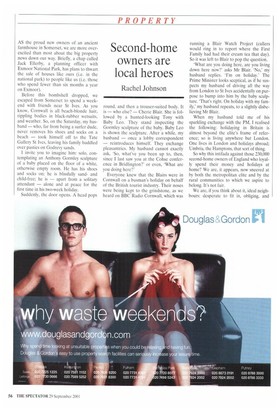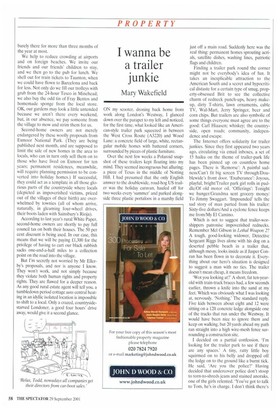Second-home owners are local heroes
Rachel Johnson
AS the proud new owners of an ancient farmhouse in Somerset, we are more overexcited than most about the big property news down our way. Briefly, a chap called Jack Ellerby, a planning officer with Exmoor National Park, has plans to thwart the sale of houses like ours (i.e. in the national park) to people like us (i.e. those who spend fewer than six months a year on Exmoor).
Before this bombshell dropped, we escaped from Somerset to spend a weekend with friends near St Ives. As you know, Cornwall is all beach-blonde hair, rippling bodies in black-rubber wetsuits, and weather. So, on the Saturday, my husband — who, far from being a surfer dude, never removes his shoes and socks on a beach — took himself off to the Tate Gallery St Ives, leaving his family huddled over pasties on Godrevy sands.
I invite you to imagine him: solo, contemplating an Anthony Gormley sculpture of a baby placed on the floor of a white, otherwise empty room. He has his shoes and socks on; he is blissfully sandand child-free; he is — apart from a solitary attendant — alone and at peace for the first time in his two-week holiday.
Suddenly, the door opens. A head pops
round, and then a trouser-suited body. It is — who else? — Cherie Blair. She is followed by a hunted-looking Tony with Baby Leo. They stand inspecting the Gormley sculpture of the baby. Baby Leo is shown the sculpture. After a while, my husband — once a lobby correspondent — reintroduces himself. They exchange pleasantries. My husband cannot exactly ask, 'So, what've you been up to, then, since I last saw you at the Cohse conference in Bridlington?' or even, 'What are you doing here?'
Everyone knew that the Blairs were in Cornwall on a busman's holiday on behalf of the British tourist industry. Their noses were being kept to the grindstone, as we heard on BBC Radio Cornwall, which was running a Blair Watch Project (callers would ring in to report where the First Family had had their cream tea that day). So it was left to Blair to pop the question.
'What are you doing here, are you living down here now?' asks Mr Blair. 'No,' my husband replies. 'I'm on holiday.' The Prime Minister looks sceptical, as if he suspects my husband of driving all the way from London to St Ives accidentally on purpose to bump into him by the baby sculpture. 'That's right. On holiday with my family,' my husband repeats, to a slightly disbelieving Mr Blair.
When my husband told me of his sparkling exchange with the PM, I realised the following: holidaying in Britain is almost beyond the elite's frame of reference; so is living anywhere but London. One lives in London and holidays abroad; Umbria, the Hamptons, that sort of thing.
So why this intifada against those 230,000 second-home owners of England who loyally spend their money and holidays at home? We are, it appears, now sneered at by both the metropolitan elite and by the rural communities to which we aspire to belong. It's not fair.
We are, if you think about it, ideal neighbours: desperate to fit in, obliging, and barely there for more than three months of the year at most.
We help to reduce crowding at airports and on foreign beaches. We invite our friends and our friends' children to stay, and we then go to the pub for lunch. We shell out for train tickets to Taunton, when we could have flown to Barcelona and back for less. Not only do we fill our trolleys with grub from the 24-hour Tesco in Minehead; we also buy the odd tin of Fray Bentos and homemade sponge from the local store. OK, our gardens may look a little untended because we aren't there every weekend, but, in our absence, we pay someone from the village to mow and strim them for us.
Second-home owners are not merely endangered by these woolly proposals from Exmoor National Park. (They are being published next month, and are supposed to limit the sale of new homes in the area to locals, who can in turn only sell them on to those who have lived on Exmoor for ten years; permanent residences, meanwhile, will require planning permission to be converted into holiday homes.) If successful, they could act as a template in all those glorious parts of the countryside where locals (depicted as impoverished victims, priced out of the villages of their birth) are overwhelmed by townies (all of whom arrive, naturally, in gleaming four-wheel drives, their boots laden with Sainsbury's Rioja).
According to last year's rural White Paper, second-home owners are shortly to pay full council tax on both their houses. The 50 per cent discount is being axed. In our case, this means that we will be paying £1,300 for the privilege of having to cart our black rubbish sacks one-and-a-half miles to a collection point on the road into the village.
But I'm secretly not worried by Mr Ellerby's proposals, and nor is anyone I know. They won't work, and not simply because they violate both human rights and property rights. They are flawed for a deeper reason. As any good rural estate agent will tell you, a tumbledown period cottage sans central heating in an idyllic isolated location is impossible to shift to a local. Only a crazed, countrysidestarved Londoner, a good four hours' drive away, would give it a second glance.







































































 Previous page
Previous page